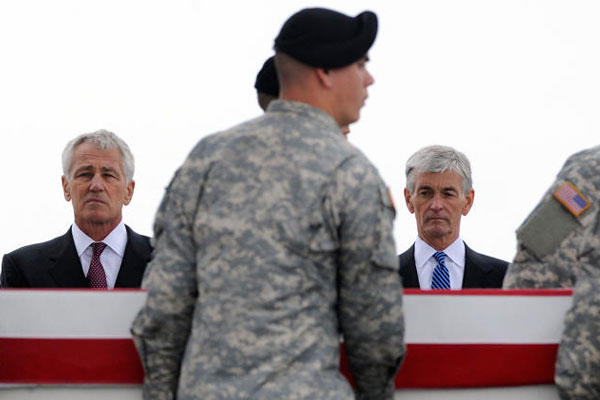The U.S. Defense Department is working with a nonprofit to restore death benefits to families of troops killed in Afghanistan after the payments were suspended because of the government shutdown.
The Pentagon partnered with the Fisher House Foundation to resume the benefits, including a $100,000 death gratuity payment. The organization is traditionally known for providing low-cost lodging to families of service members receiving treatment at military medical centers.
"I am offended, outraged, and embarrassed that the government shutdown had prevented the Department of Defense from fulfilling this most sacred responsibility in a timely manner," Defense Secretary Chuck Hagel said in a statement.
The announcement came after the families of four soldiers and one Marine killed in Afghanistan over the weekend were informed that they would be denied benefits while the shutdown continued, leaving at least one mother in despair and disbelief.
As outrage over the controversy grew, President Obama on Wednesday vowed to restore the benefits. The U.S. House of Representatives voted unanimously to pass the Honoring the Families of Fallen Soldiers Act, which authorizes the payments.
Not waiting for Congress to approve the legislation, the Defense Department announced it accepted the Fisher House Foundation offer to provide the $100,000 death benefit to the families and also cover expenses for flights, hotels and other costs for family members to attend funerals until the government can make re-imbursements.
"The Fisher House Foundation will provide the families of the fallen with the benefits they so richly deserve," Hagel said in the statement. "After the shutdown ends, DoD will reimburse the Fisher House for the costs it has incurred."
The contractual agreement was vetted by the White House's Office of Management and Budget, Hagel said.
Fischer House officials first reached out to Pentagon leaders on Tuesday after first finding out through media reports that the shutdown had kept the Defense Department from paying families death benefits, said David Coker, President, Fischer House Foundation Inc.
The Fischer House has set aside $4 million in an emergency assistance fund in order to pay families. Officials from the charities are working with the military's casualty assistance officers to identify the family beneficiaries who will receive the checks.
"These are families that have lost loved ones and their loved ones gave their lives for our country," Coker said in a phone interview with Military.com. "We felt the need to step in and see what we could do to help fill the gap and eliminate any financial burden that they may be under right now."
The organization has already provided some of the families with free airline tickets and hotel accommodations to witness the return of the soldiers' caskets at Dover Air Force Base, Del. Hagel attended the Wednesday ceremony with Army Secretary John McHugh and Army Chief of Staff Gen. Raymond Odierno.
The four Army troops were killed on Sunday by an improvised explosive device as they entered a building in the Zhari district of southern Kandahar province.
They were identified as 1st Lt. Jennifer M. Moreno, 25, of San Diego, Calif., assigned to Madigan Army Medical Center, Joint Base Lewis-McChord, Wash.; Sgt. Patrick C. Hawkins, 25, of Carlisle, Pa., assigned to the 3rd Battalion, 75th Ranger Regiment, Fort Benning, Ga.; Sgt. Joseph M. Peters, 24, of Springfield, Mo., assigned to the 5th Military Police Battalion, Vicenza, Italy; and PFC Cody J. Patterson, 24, of Philomath, Ore., assigned to the 3rd Battalion, 75th Ranger Regiment, at Fort Benning, Ga.
In a separate incident on Sunday, Lance Cpl. Jeremiah Collins, of Milwaukee, Wis., was killed in southwestern Helmand province in Afghanistan. Collins was an intelligence analyst assigned to Combat Logistics Regiment 2, 2nd Marine Logistics Group, II Marine Expeditionary Force, based in Camp Lejeune, N.C.
It's not just troops who were killed in combat who receive death benefits. Coker said 20 separate families will receive death benefit checks from the Fischer House thus far since their servicemembers died after the start of the government shutdown.
Pentagon officials said that the "Pay Our Military Act," passed by Congress just before the government shutdown began last week, provided for the basic pay of the military during the political impasse, but did not allow for the payment of death benefits.
"In the days after the shutdown, Departmental lawyers and budget officials pursued every tool and option at our disposal in an effort to provide these benefits," Hagel said. "Even under the Pay Our Military Act, we found that we lacked the necessary authority to make payments to the families directly."
Coker said the foundation made the offer to pay the death gratuities without the expectation of being paid back. Fischer House officials are focused on figuring out how to issue checks to grieving families and will figure out later how the Defense Department will pay the foundation back, he said.\
"We'll catch up with that later," Coker said. "The families need to be the first priority."
The government shutdown, now in its ninth day, began Oct. 1 after Congress failed to pass a budget or short-term funding resolution for fiscal 2014.
The Republican-controlled House has demanded that any legislation to temporarily fund the government include language to scale back President Obama's signature health-care law, the 2010 Affordable Care Act, commonly known as Obamacare. The Democrat-controlled Senate and the White House have opposed any such provision, resulting in the impasse.
Lawmakers are also under pressure to reach an agreement to raise the federal debt limit before Oct. 17, when the Treasury Department will exhaust its ability to borrow.
"The Department has no higher priority than taking care of our service members and their families," Hagel said. "Congress has responsibilities as well, and it has abdicated them."
- Michael Hoffman contributed to this report.






























